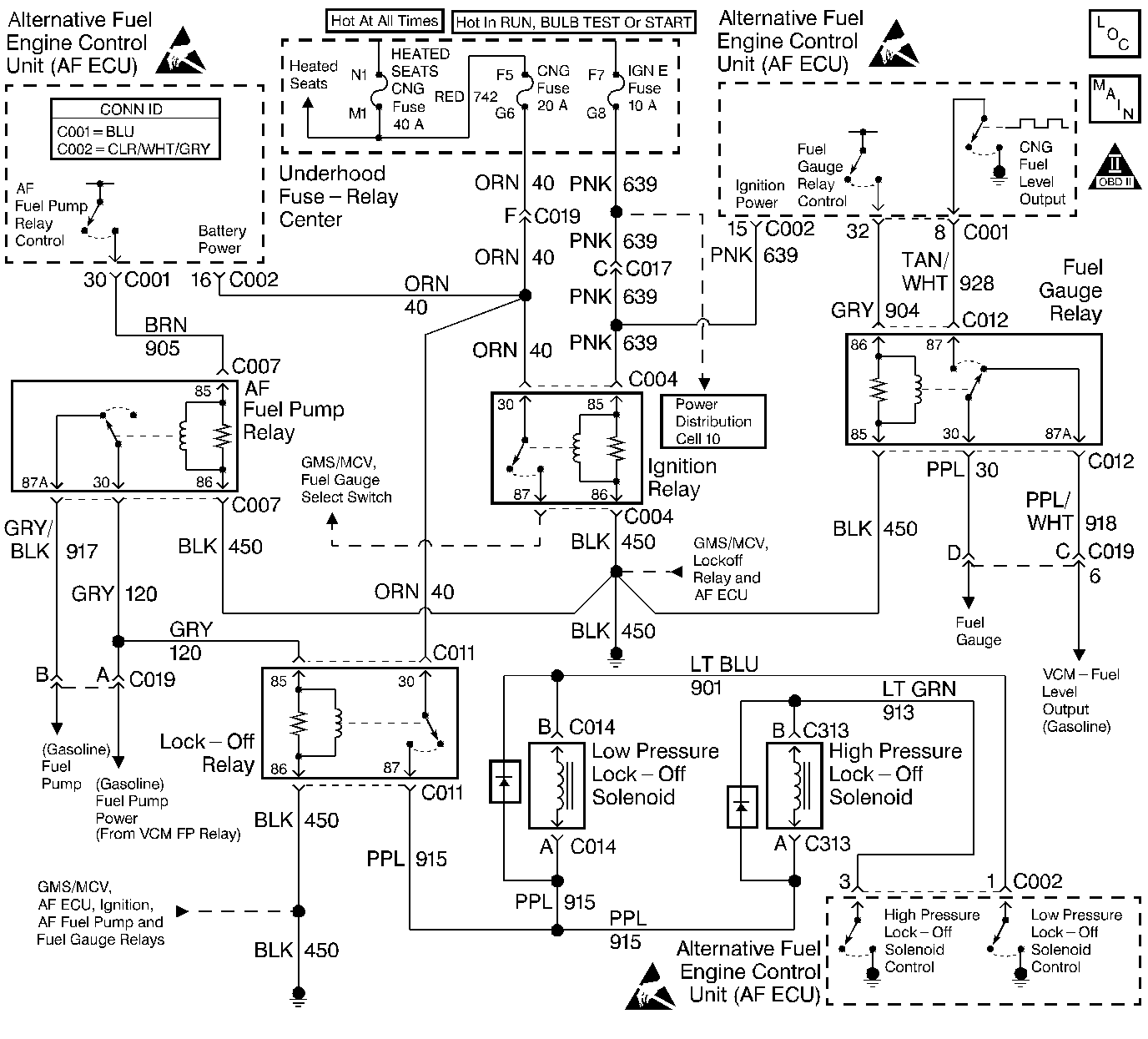
Circuit Description
The fuel gauge relay coil is supplied a ground path all the time. The coil power is supplied by the AF ECU. When the vehicle is operating in the CNG mode the AF ECU energizes the fuel gauge relay allowing the CNG Fuel Level Output to be displayed by the fuel gauge. When the vehicle is operating in the gasoline mode the AF ECU does NOT energize the fuel gauge relay allowing the gasoline Fuel Level Output to be displayed by the fuel gauge.
Regardless of the fuel system in operation the AF ECU monitors the Fuel Gauge Select Switch Input circuit. When the vehicle operator depresses the switch the AF ECU will display the DORMANT (non-operating) fuel system level by energizing (when operating on gasoline) or de-energizing (when operating on CNG) the fuel gauge relay. The dormant fuel level will be displayed for about 10 seconds.
Test Description
The numbers below refer to the step numbers on the diagnostic table.
-
The AF PowertrainOn-Board Diagnostic (OBD) System Check must be performed before proceeding with this diagnostic table. Failure to perform the OBD System Check will result in misdiagnosis.
-
This step checks the AF ECU's ability to operate the fuel gauge.
-
This step checks the ability of the fuel gauge relay to switch to the gasoline fuel level.
-
With CNG enabled, the AF ECU powers the Fuel Gauge Relay Control circuit energizing the fuel gauge relay.
-
This step checks for a shorted Fuel Gauge circuit or an instrument panel failure. With the Fuel Gauge circuit disconnected, the fuel gauge should show a defaulted reading of past full.
-
Jumpering the Fuel Gauge circuit to ground should cause the fuel gauge to indicate Empty.
-
This step determines if the fuel gauge relay is the cause of the CNG fuel gauge concern.
-
This step checks for proper operation of the fuel gauge select switch.
-
This step determines if the fuel gauge relay is the cause of the gasoline fuel gauge concern.
Step | Action | Value(s) | Yes | No | ||||||||||
|---|---|---|---|---|---|---|---|---|---|---|---|---|---|---|
1 |
Important: The vehicle MUST operate on CNG in order to use this diagnostic procedure. Did you perform the AF Powertrain On-Board Diagnostic (OBD) System Check? | -- | Go to Alternative Fuels (AF) Powertrain On Board (OBD) System Check | |||||||||||
Using the scan tool, communicate with the AF ECU and command the Fuel Gauge Output from full to empty. Does the fuel gauge respond correctly? | -- | |||||||||||||
Does the fuel gauge indicate the same level as the gasoline Fuel Level scan tool parameter for about 10 seconds and then return to displaying the CNG fuel tank level? | -- | |||||||||||||
4 | Is there a CNG fuel gauge accuracy concern? | -- | ||||||||||||
5 | Is there a gasoline fuel gauge accuracy concern? | -- | System OK | |||||||||||
Does the test lamp illuminate? | -- | |||||||||||||
Does the fuel gauge indicate PAST Full? | -- | |||||||||||||
Jumper the Fuel Gauge circuit terminal 30 to a known good ground using a fused jumper. Does the fuel gauge indicate Empty after being jumpered for several seconds? | -- | |||||||||||||
Does the fuel gauge respond correctly? | -- | |||||||||||||
Did the test lamp illuminate, turn OFF for about 10 seconds and then illuminate again? | -- | |||||||||||||
Does the fuel gauge indicate the same level as the scan tool Fuel Level parameter? | -- | |||||||||||||
12 | Connect the test lamp between the Fuel Gauge Relay coil ground circuit terminal 85 and B+. Is the test lamp illuminated? | -- | ||||||||||||
13 |
Is the repair complete? | -- | -- | |||||||||||
14 |
Is the repair complete? | -- | -- | |||||||||||
15 |
Was a circuit repair necessary? | -- | ||||||||||||
16 |
Was a circuit repair necessary? | -- | ||||||||||||
17 |
Is the repair complete? | -- | -- | |||||||||||
18 |
Was a terminal or wiring repair made? | -- | ||||||||||||
19 | Repair the open Fuel Gauge Relay coil ground circuit between the relay terminal 85 and the circuit splice. Is the repair complete? | -- | -- | |||||||||||
20 | Replace the Fuel Gauge Relay. Is the replacement complete? | -- | -- | |||||||||||
21 |
Is the replacement complete? | -- | -- | |||||||||||
22 |
Does the vehicle operate on CNG with normal driveability, no FIL/MIL illumination, and no stored DTCs? | -- | System OK | Go to Alternative Fuels (AF) Powertrain On Board (OBD) System Check |
